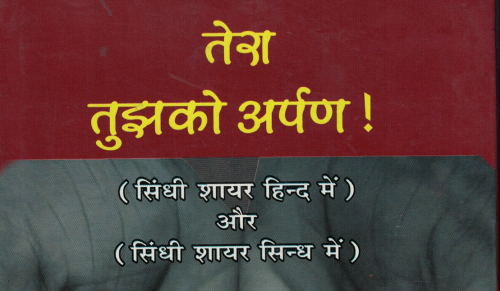From Sindh with Love
. In an atmosphere vitiated by the foul smell of gun powder and rattling of machine guns on the border every day, this book of verses translated from Sindhi to Hindi by Gul Bhatia comes as a serene gust of fragrant wind. The two ends of the bridge are categorically mentioned in the sub title of the book " Sindhi Shayar Hind mein aur Sindhi Shayar Sindh mein" ( Sindhi Poets in India and Sindhi poets In Sindh).

Politics divides but literature unites. Literature builds bridges between those whom politics had segregated. This bridge is made of love, emotions, longing and the pain of partition. The book “Tera Tujhko Arpan” is one such bridge that unites the people across the border drawn by the Radcliffe Line which divided Indian people into two nations India and Pakistan.
In an atmosphere vitiated by the foul smell of gun powder and rattling of machine guns on the border every day, this book of verses translated from Sindhi to Hindi by Gul Bhatia comes as a serene gust of fragrant wind. The two ends of the bridge are categorically mentioned in the sub title of the book ” Sindhi Shayar Hind mein aur Sindhi Shayar Sindh mein” ( Sindhi Poets in India and Sindhi poets In Sindh). Published by Pustak Sadan in 2014 the book carries poems by forty six poets who are Indians and sixteen poets who live in Pakistan. Both the groups of poets have composed their poems in Sindhi. Mr. Gul Bhatia has painstakingly selected a few of their writings and very judiciously put before the Hindi world the best pearls from the contemporary Sindhi literature.
On the back cover of the book are published pictures of the two friend poets Sheikh Ayaz and Narayan Shyam. After partition Sheikh Ayaz remained in Pakistan while Narayan Shyam came to India. Their friendship continued. In 1965 when a war broke out between India and Pakistan Sheikh Ayaz wrote : “This battle!/ opposite to me is Narayan Shyam/ his and mine promises are the same/ words are the same/ he is a doyen of poetry/ my taste is similar too/ same are the river banks, same the drums/same hearts and same the swings/ how do I aim my gun at him/ how do I shoot him? How?/How?/How?”. This small poem which had only the voice of love and no venom was taken by the then Pakistani rulers as anti national and Sheikh Ayaz was put in Jail for one and a half years. The translator has selected another poem of Sheikh Ayaz which shows the liberal spirit and broad vision of the poet. The poem is addressed to his grandson and is titled “My Grandson”. This poem could be treated as a message to humanity : ” My Grandson!/ when you grow young and are able to think for yourself/ I grant you the permission/ to speak the language you like./ The shade of the country you prefer/ live in that/ and join the sect wherein you feel a sense of oneness / adopt a religion that you like/ And whether you believe in any divine truth or not/ I leave unto you/ in inheritance I give you freedom of thought.”
Three eminent Hindi -Urdu poets have written their messages for the book and have also applauded the work of Gul Bhatia. They are none less than famous voice of Hindi poetry Bal Kavi Bairagi, former Member of Parliament, Iqbal Hussain “Iqbal” founder of Navkriti and author of the book Achchi Lagti hai Guftagu Teri and a very versatile poet of Urdu Krishna Kumari. The translator has used Hindi as well as Urdu diction and the poetic forms of Gazal and free verse as per the requirement of the original Sindhi poems. The love for Sindhi language , culture and heritage is visible in this effort. Bhatia has done a service to the Sindhi writers and poets but has done an equally important work for Hindi poets also who can now get to know that Sindhi poets in Pakistan also think and feel like us. The hate campaigns of certain fundamentalist forces can be countered by such messages of love.
Contributed by: Dr H.S.ChandaliyaTo join us on Facebook Click Here and Subscribe to UdaipurTimes Broadcast channels on GoogleNews | Telegram | Signal


